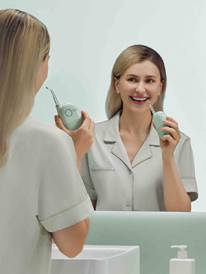Mia Klitsas Moxie and AFRIpads Interview
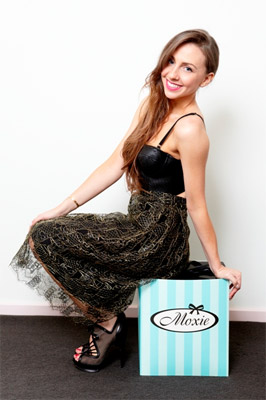
Mia Klitsas Moxie and AFRIpads Interview
One in ten African girls skips school when they menstruate due to their lack of access to effective sanitary products. Poor menstrual management among these school girls results in them missing 20 per cent of their school year; this profoundly impacts the ability of these girls to reach their full academic potential.
On behalf of the team at Moxie, Mia Klitsas is proud to announce the launch of the -One for the Girls' initiative in partnership with Ugandan based social organisation AFRIpads. With the help of AFRIpads, we will provide sanitary products and menstrual education to a minimum of 6,000 young Ugandan school girls so that they can continue their schooling uninterrupted, and get the education they each deserve.
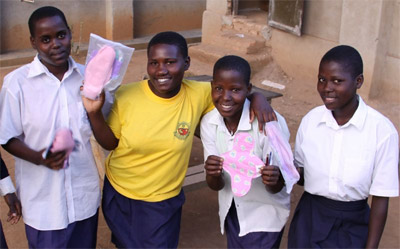 For every pack of Moxie Slenders Pads, Moxie Slenders Liners and Moxie Sleepovers Pads sold, Moxie will provide the equivalent amount of washable and reusable pads in the form of -Deluxe Menstrual Kits' that will last each young woman up to a year. The kits are hand-made locally in Uganda by a team of over 50 women - this is also an important element of the program as it allows these women to generate an income and send their own children to school.
For every pack of Moxie Slenders Pads, Moxie Slenders Liners and Moxie Sleepovers Pads sold, Moxie will provide the equivalent amount of washable and reusable pads in the form of -Deluxe Menstrual Kits' that will last each young woman up to a year. The kits are hand-made locally in Uganda by a team of over 50 women - this is also an important element of the program as it allows these women to generate an income and send their own children to school.
Without these -Deluxe Menstrual Kits', the alternative reality for young school girls when they have their period is to use homemade solutions, such as newspapers, leaves, banana fibers and old clothing. Such methods are not only inefficient (in terms of absorption) and uncomfortable, but often result in infection. Hence, along with their periods often comes a great deal of embarrassment and shame.
The aim is to change this.
The -One for the Girls' program will not only result in more menstrual kits being distributed to girls in need throughout Uganda, but will also involve a public affairs campaign to highlight the issues surrounding the education of young women.
The -One for the Girls' program commences July 2013. To find out more about AFRIpads and our partnership, please visit www.moxie.com.au
Interview with Moxie co-founder and director, Mia Klitsas
Question: What is the One for the Girls initiative?
Mia Klitsas: One for the Girls is really exciting. Coincidently I received an article via email from a friend a few months ago that talked about the really high rates for absentees amongst Ugandan school girls due to the fact that they didn't have proper menstrual or sanitary products to manage their periods. The girls missed out on school because they were using things like banana leaves, dirt and old rags to help them manage their period none of which are efficient means and as a result these girls were missing out on 20% of their school year. The article really hit home, it was heartbreaking to read that simple things we take for granted such as having a pad or tampon wasn't available for them.
Question: How does the partnership with Ugandan based social organisation AFRIpads work?
Mia Klitsas: AFRIpads are a Ugandan based social organisation that facilities, manufactures and distributes reusable cloth pads as in Uganda they do not have adequate infrastructure for disposable products. AFRIpad employee Ugandan women and we thought that was an incredible initiative. We came up with the One for the Girls initiative which with every pack of Moxie Slenders Pads, Moxie Slenders Liners and Moxie Sleepovers Pads sold in Australia we will donate the equivalent amount of locally made reusable pads to girls in Uganda so that they can continue their schooling. It is a simple pads for pads solution and that is what dawned on me as soon as I read that article.
It's about girls in Australia helping girls in Uganda, in a simple way.
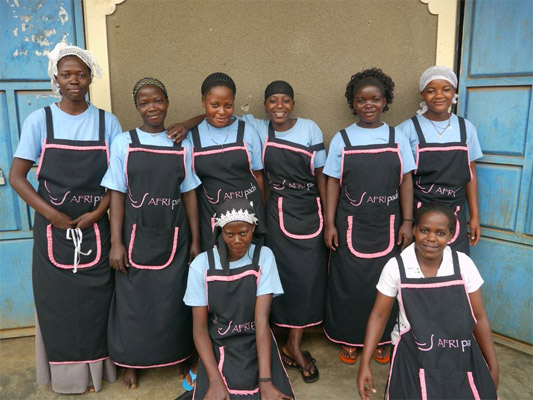 Question: How will Moxie go about providing menstrual education to a minimum of 6,000 young Ugandan school girls?
Question: How will Moxie go about providing menstrual education to a minimum of 6,000 young Ugandan school girls?Mia Klitsas: We hope to support 6,000 young Ugandan school girls each with a year's supply of reusable pads and along with that is education. There is taboo surrounding periods, already even in Australia let alone a third world country where the menstrual cycle is even less discussed as there is a lot of superstition around periods. It's also not something the Ugandan school girls are comfortable to talk about. We've facilitated the education to be able to go to Uganda and educate the girls on how to use their kits, how to look after the product and to teach them what happens to their bodies. A lot of the Ugandan school girls don't even know what a period is when they get it and they think there is something wrong with them.
It's very important for us to empower these girls with the knowledge so they understand what is going on and they know that it's normal and they can now continue their lives and schooling uninterrupted as it's a healthy, normal process. We want to give them the tools to help them better manage through it.
Question: How does the experience African girls have when they get their period differ from us?
Mia Klitsas: These girls want to learn, it's an opportunity for them because if they're not at school learning they're at home doing chores or hard manual labour. The biggest opportunity for them is to educate themselves. In a way the Ugandan girls are exactly like us, they're young women who want the same things that we want and they care about the way they look, like we do; they care about their education and having a job or a career. However they don't have the means.
Question: How does this impact their future?
Mia Klitsas: The lack of education is what hit me in the face, it got me and I felt an immediate responsibility.
Question: How does the program also activate a public affairs campaign to highlight the issues surrounding the education of young women?
Question: How can Australians help support this campaign?
Mia Klitsas: For every pack of Moxie Slenders Pads, Moxie Slenders Liners and Moxie Sleepovers Pads sold, Moxie will provide the equivalent amount of washable and reusable pads in the form of -Deluxe Menstrual Kits' that will last each young woman up to a year.
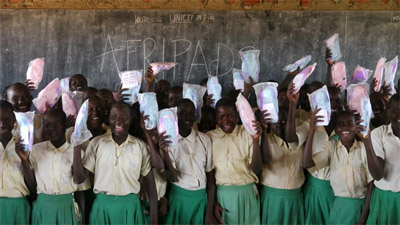 Australians can tell their friends and spread the word. We are doing a lot on social media including Facebook, Twitter and Instagram. We are also using the #oneforthegirls for Australians to post pictures or comments of what they're grateful for such as 'I'm grateful for the great coffee I had this morning" or 'I'm grateful that I have a straightener" – the little things that we take for granted, it's about counting your blessings and spreading the message that way. A lot of people don't like talking about periods and we hope to create more awareness around the issue in a positive way which will be good for young Australians, as well.
Australians can tell their friends and spread the word. We are doing a lot on social media including Facebook, Twitter and Instagram. We are also using the #oneforthegirls for Australians to post pictures or comments of what they're grateful for such as 'I'm grateful for the great coffee I had this morning" or 'I'm grateful that I have a straightener" – the little things that we take for granted, it's about counting your blessings and spreading the message that way. A lot of people don't like talking about periods and we hope to create more awareness around the issue in a positive way which will be good for young Australians, as well. Question: What are your hopes for the campaign?
Mia Klitsas: We can support 6,000 young Ugandan school girls in the next six months and we hope this can be a forever thing with us, we hope to be able to continue this. Beyond that through the work that AFRIpads do as they make the reusable cloth pads locally, they're employing women, locally, which creates about 60 jobs at the moment. The more pads we sell in Australia, the more kits we can donate which means the more jobs we are creating for these women who are improving their skills and bettering their lives which earns enough to send their kids to school. Whilst we say 6,000 girls the trickle down affect is huge which is really exciting.
Interview by Brooke Hunter
MORE
- Rack It Range Extensions
- Lunch Style 2016
- Nicholas Demos Solving Life Issues Online...
- Warm Up With DeLonghi This Winter
- Chill Out Chair
- Spring 2014 Dulux
- in.cube8r
- Forty Winks: Buyer's Guide To Bedding
- Ageing In One's Own Home
- European Apothecary Sea Salt Candle
- Survey Reveals Housework Wars Behind Closed Doors



